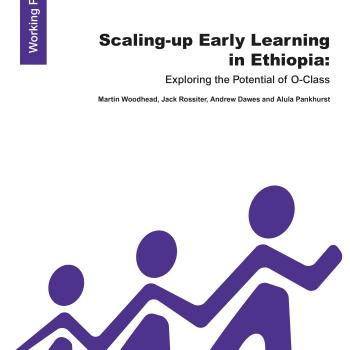Publication Information

SDG Target 4.2 identifies ‘pre-primary education’ as a strategy to strengthen school readiness and contribute to the quality and outcomes of education, which is supported by the powerful evidence from evaluation research. The challenge faced by many countries is to deliver the proven potential of well-planned, quality programmes to scale. This working paper summarises Ethiopia’s growing commitment to pre-primary education and reports recent Young Lives engagement with the Ministry of Education in Ethiopia and other partners to support scale-up. Ethiopia’s most recent ambitious targets for early learning have been set out in the Fifth Education Sector Development Programme (ESDP V 2015), with pre-primary classes (known as O-Class) within primary schools being seen as the most rapid route to scale-up.
The paper reports on the progress and the challenges in delivering ambitious targets. We report key findings from exploratory fieldwork on two key themes, namely the response of Regional Education Bureaus in planning, financing, management and ensuring human capacity for scale-up; and the potential of Ethiopia’s Colleges of Teacher Education to supply sufficient trained teachers to work with young children, especially in the rapidly expanding O-Classes.
The final section draws on parallel experiences of other countries, notably Grade R in South Africa, and reports on six key challenges for scale-up; equity; age-appropriateness; cross-sectoral coordination; capacity building; and research and evidence. Other key challenges go beyond the scope of this working paper, notably the models for governance and financing that can deliver quality early education for all. While Ethiopia’s initiative to scale-up O-Class is a welcome indicator of policy commitment to SDG Target 4.2, we conclude that there is a risk that low quality pre-primary programmes will not deliver on the potential of early childhood education and that children (especially poor children) will be the losers.

SDG Target 4.2 identifies ‘pre-primary education’ as a strategy to strengthen school readiness and contribute to the quality and outcomes of education, which is supported by the powerful evidence from evaluation research. The challenge faced by many countries is to deliver the proven potential of well-planned, quality programmes to scale. This working paper summarises Ethiopia’s growing commitment to pre-primary education and reports recent Young Lives engagement with the Ministry of Education in Ethiopia and other partners to support scale-up. Ethiopia’s most recent ambitious targets for early learning have been set out in the Fifth Education Sector Development Programme (ESDP V 2015), with pre-primary classes (known as O-Class) within primary schools being seen as the most rapid route to scale-up.
The paper reports on the progress and the challenges in delivering ambitious targets. We report key findings from exploratory fieldwork on two key themes, namely the response of Regional Education Bureaus in planning, financing, management and ensuring human capacity for scale-up; and the potential of Ethiopia’s Colleges of Teacher Education to supply sufficient trained teachers to work with young children, especially in the rapidly expanding O-Classes.
The final section draws on parallel experiences of other countries, notably Grade R in South Africa, and reports on six key challenges for scale-up; equity; age-appropriateness; cross-sectoral coordination; capacity building; and research and evidence. Other key challenges go beyond the scope of this working paper, notably the models for governance and financing that can deliver quality early education for all. While Ethiopia’s initiative to scale-up O-Class is a welcome indicator of policy commitment to SDG Target 4.2, we conclude that there is a risk that low quality pre-primary programmes will not deliver on the potential of early childhood education and that children (especially poor children) will be the losers.

